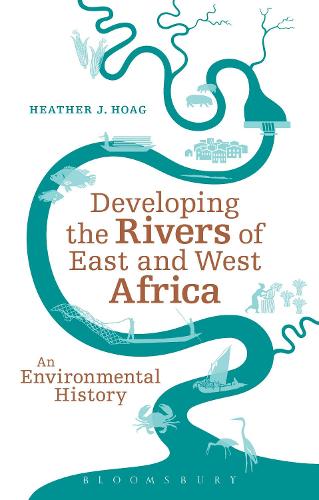
Developing the Rivers of East and West Africa: An Environmental History
(Paperback)
Publishing Details
Developing the Rivers of East and West Africa: An Environmental History
By (Author) Professor Heather J. Hoag
Bloomsbury Publishing PLC
Bloomsbury Academic USA
12th September 2013
United States
Classifications
Tertiary Education
Non Fiction
History of science
The environment
551.483096
Physical Properties
Paperback
304
Width 136mm, Height 214mm, Spine 20mm
380g
Description
How did rivers contribute to the economic and political development of modern Africa How did African and European notions of nature's value and meaning differ And how have these evaluations of Africa's rivers changed between 1850 and the present day Drawing upon examples from across the African continent, Developing the Rivers of East and West Africa explores the role African waterways played in the continent's economic, social, and political development and provides the first historical study of the key themes in African river history. Rivers acted as more than important transportation byways; their waters were central to both colonial and postcolonial economic development efforts. This book synthesizes the available research on African rivers with new evidence to offer students of African and environmental history a narrative of how people have used and engaged the continent's water resources. It analyzes key themes in Africa's modern history - European exploration, establishment of colonial rule, economic development, 'green' politics - and each case study provides a lens through which to view social, economic and ecological change in Africa.
Reviews
Serving as a useful introduction to hydrological themes in African environmental history, this book adds to the historical coverage of Africas waterscapes by focusing primarily on East Africa, with a chapter on Ghanas Volta River. However, the Rufiji River region of Tanzania dominates. These sections most clearly demonstrate the authors themes, notably, the juxtaposition of European scientific knowledge and local ecological knowledge, as well as the recurrent need to gain historical context before embarking on hydrological projects. Overall, Hoag (Univ. of San Francisco) presents a well-documented environmental history and delivers fascinating insights into how both East African and colonial populations have understood and misunderstood the rivers on which they depended. Summing Up: Recommended. All academic levels/libraries. -- J. R. Kenyon, University of Idaho * CHOICE *
One of the strengths of this study is its treatment of conflicting goals within colonial and early independence planning regarding the regulation of rivers.Hoag is very effective in her examination of the varied goals and effects of development programs linked to rivers. This is a very original study on a topic that is of paramount importance in understanding changing conceptions and results of development. The books organization and wide scope would work well in an advanced undergraduate or graduate course. All inall, this book is highly recommended. -- Jeremy Rich, Marywood University * International Journal of African Historical Studies *
[Hoag] offers an overview of modern African history that will be useful to readers interested in the environmental history of water development across the continent. -- Thaddeus Sunseri, Colorado State University * Environmental History, vol 20, no 1 *
Heather Hoag has written an eclectic book. One hopes that it will whet the thirst of other scholars to explore vital research questions in Africas water history. -- James L. A. Webb Jr., Colby College * The Historian *
[This book] provides the most significant historicalgeographical treatment of rivers in Africa since W.M. Adams enduringly influential study, Wasting the rain: rivers, people and planning in Africa ... [Developing the rivers of East and West Africa] merits a wide readership and the crisp concluding sections with which Hoag wraps up each chapter make it particularly student-friendly, as does the historical glossary. -- Peter Coates, University of Bristol * European Review of History *
Author Bio
Heather J. Hoag is Associate Professor of History at the University of San Francisco, USA. She is one of the founding editors for the International Water History Association's journal, Water History.
